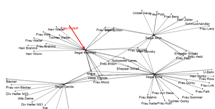
Topographic survey
Following the start of the new season of excavation at the Palazzo Imperiale, being undertaken together with a restoration project, we have started planning all the walls and floor surfaces. A few months back I undertook a photogrammetric survey of all the standing walls that will be restored in the area, and am now fixing these into the site plan. Yesterday we cleaned USM11043 and began a detailed survey of the wall.
Continue reading →




